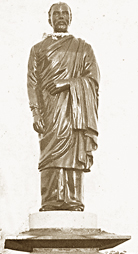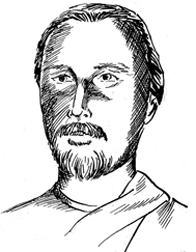Walisinghe Harischandra - the young revivalist
by Jayanatha MENDIS
What is important to know of a man is how he lived not how long he
lived Walisinghe Harischandra lived for only 37 years, but within this
relatively short period what he did to protect the places sacred to
Buddhists and other sites of archaeological or historical interest was
much and invaluable.
 |
|
Statue at Anuradhapura |
 The most important political event in the 19th century was the
downfall of the Kandyan Kingdom and the establishment of British rule in
1815. When the march to Kandy began, Gen. Brownrigg declared it was "Led
by the invitation of the Chiefs and welcomed by the acclamation of the
people." The most important political event in the 19th century was the
downfall of the Kandyan Kingdom and the establishment of British rule in
1815. When the march to Kandy began, Gen. Brownrigg declared it was "Led
by the invitation of the Chiefs and welcomed by the acclamation of the
people."
The Lion Flag that Vijaya had planted in Thambapanni was hauled down
and the Union Jack went up on the 2nd of March 1815. On this day, in the
Hall of Audience of the Kandyan Kings, the historic Kandyan Convention
was signed. Its Article 5 guaranteed the inviolability of the national
religion and the "Protection and the maintenance of its rites, priests
and temples".
In a separate dispatch to the Secretary of State the General wrote,
"In truth, our secure possession of the country hinged upon this point.
I found it necessary to quieten all uneasiness respecting it by an
Article of Guarantee couched in the most unqualified terms". So we know
the British authorities were not serious about their promises.
Even before the ink had dried in the historic document, Keppetipola
rose in open rebellion against the new administration proving that the
people were disillusioned and dissatisfied with the Colonial
administration.
This 1818 rebellion was ruthlessly put down but a smouldering
discontent towards administration continued. The root cause of this
hostility to the new regime was the fact Buddhist kings were succeeded
by Christian governors who couldn't genuinely take part in Buddhist
rites festivals, processions and so on with the same religious zeal as
hereditary kings.
Buddhism flourished and granaries were replenished with regular
harvests nourished by waters from a network of ingeniously built canals
and tanks - all under royal patronage.
Now that this royal patronage missing, tropical jungle slowly and
steadily crept over breached tanks, uninhabited villages, abandoned
paddy lands, enveloping in itself medieval courtyards, monastic sites
and many remains of archaeological or sculptural value vivified by
nameless artists, all pointing to a civilization which, with all its ups
and downs continued to flourished for nearly twenty four centuries.
It is against this background that Walisingha Harischandra launched
his two-pronged campaign.
Now let's see what sort of person he was. We can glean an idea about
what sort of person he was when Ven. Balangoda Ananda Maithree Maha
Thera recalled an event in the life of this national hero: "On the 5th
of November, 1905 Walisinghe Harischandra arrived at Balangoda. Then I
was a nine-year old boy. He made two speeches at Kumara Vidyalaya in the
evening. He spoke to the children and advised them a great deal using
such language as they could understand. He had marvellous eloquence. His
voice was deep but pleasant to hear. As he spoke, his tone rose and fell
in a resonant voice. He had great charm about him and a serene look like
that of an ascetic radiating kindness.
He was born on July 9th, 1876 at Maha Hunupitiya a suburban village
of Negombo. He showed his mettle and vision even as a student at college
when he refused to sing in unison, "God save the King.," on Queen
Victoria's birthday on May 24th.
The ambition of his parents was to make him a lawyer. The boy had the
gift of the gab, the parents, the means to educate him here or abroad.
But he was born to be an orator, reformer and a patriot. Had the parents
succeed in their attempt only a very few people would know Obinamini
Edward De Silva.
Fired by national feelings and religious zeal, he gave up a lucrative
legal career, adopted the name Walisinghe Harischandra, vowed to be a
celibate and embarked on his mission.
One of his objectives was to pass on to the future generations,
remains of a civilization built by Sinhala Kings and nourished by
Buddhist teachings. On his itineraries, he observed that they were in
disrepair and subject to neglect and vandalism. He drew the attention of
the White officials to this important national need.
He was moved by the sordid condition of Anuradhapura, the ancient
capital of Lanka. Among the business premises that had come up, there
were meat stalls and liquor bars within close proximity to the Buddhist
shrines. He made up his mind to stop this desecration and published a
booklet named, the Sacred City of Anuradhapura and sent a copy to King
George V. In this book he pointed out that the Crown representatives
despoiled Buddhist Holy places and appealed to him to protect their
sanctity. Before he died, he was able to hear that his request had been
granted.
He also rose against the Wasteland Ordinance. The British authorities
made use of it to acquire temple lands for construction work. When the
government was about to acquire Mihintale Temple lands he made a
vehement protest saying such action was real expropriation of clerical
property. The government feared that this action might trigger off a
major crisis and dropped the idea.
Walisinghe Harischandra's other objective was to uplift a decadent
community. He was sad to see that the moral and cultural deterioration
was now deep-rooted in the community. He adduced this state was due to
centuries of foreign domination of the island.
He travelled from village to village addressing crowds of people who
gathered to listen to his message. He aimed at the moral uplift of the
people and their righteous living. In this respect he also helped build
some Sunday Dhamma Schools and himself taught Dhamma at a few.
On his itineraries, sometimes not finding lodging, he had to rough it
out in ambalamas'. He was in poor health owing to under-nourishment. He
suffered all these to awaken people to the need of the hour.
In evaluating his contribution to the revivalist movement we must
bear in mind the fact that he did so much in so short a time for so
many.
When this iternent celebrate passed away on 13th of September, 1913,
he had made 1363 speeches, visited Anuradhapura 80 times, Mihintale 63
times, at a time when motor transport was not available as in the modern
day.
All these visits were not pilgrimages but were in connection with
restoration of ancient monuments which are culturally important or
sacred to the Buddhist population.
When Anagarika Dharmapala heard about his death, he mentioned, "I
wish I were dead and Walisinghe living".
|

